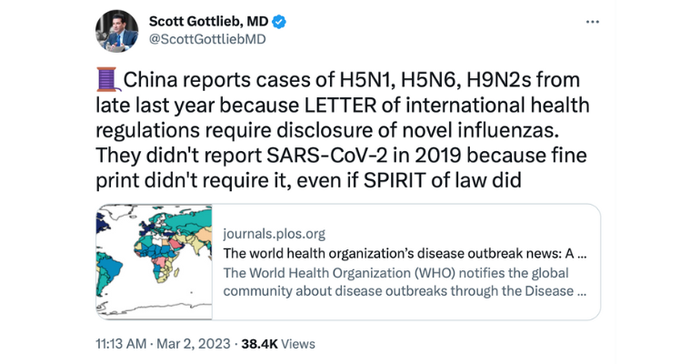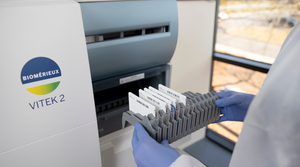Former FDA Head Wants WHO to Tighten Health Laws
In a Tweet, former FDA Commissioner Scott Gottlieb called on the World Health Organization to tighten international health laws.
March 3, 2023

Scott Gottlieb, MD, thinks the World Health Organization (WHO) should tighten international health regulations to require global disclosure of any new respiratory pathogen that has the potential for human spread. The former FDA commissioner dropped a Tweet on the subject Thursday, using China's handling of SARS-CoV-2, the virus that causes COVID-19, as his reasoning.
Gottlieb argues that China reports cases of avian flu strains H5N1, H5N6, and H9N2 because international health regulations require disclosure of new influenzas. Yet, China didn't report SARS-CoV-2 in 2019 because the law didn't specifically require it, even if the spirit of the law did.
As the international health regulations are written, countries can use a literal reading of the fine print to bypass basic public health obligations, Gottlieb said in his Tweet.

Gottlieb's Tweet links to a recently published study of WHO's Disease Outbreak News (DON), which is used to notify the global community about disease outbreaks.
"These online reports tell important stories about both outbreaks themselves and the high-level decision making that governs information sharing during public health emergencies," the authors of the study write.
The researchers collated all 2,789 of the DON reports from their first use through the start of the COVID-19 pandemic (January 1996 to December 2019), and develop an annotated database of the subjective and often inconsistent information they contain.
"We find that these reports are dominated by a mix of persistent worldwide threats (particularly influenza and cholera) and persistent epidemics (like Ebola virus disease in Africa or MERS-CoV in the Middle East), but also document important periods in history like the anthrax bioterrorist attacks at the turn of the century, the spread of chikungunya and Zika virus to the Americas, or even recent lapses in progress towards polio elimination," the researchers write.
They go on to note that the retrospective value of the reports is limited by inconsistent reporting, and conclude that sharing a transparent rubric for which outbreaks are considered reportable, and adopting more standardized formats for sharing epidemiological metadata, might help make the DON more useful to researchers and policymakers.
Gottlieb's legacy at FDA
Gottlieb, was sworn in as the 23rd commissioner of FDA on May 11, 2017. The medical device industry was quick to throw its support behind Gottlieb after he was picked to run the agency. But his tenure as the head of FDA was short lived. In 2019, Gottlieb rattled the industry with news of his resignation. Still, the agency accomplished (and endured) a lot under Gottlieb's leadership. Here are some of the milestones and controversies that occurred during the two years that Gottlieb led FDA:
FDA released a five-pronged Medical Device Safety Action Plan in April 2018, full of rhetoric aimed at convincing the public that this new plan will enhance the agency's commitment to patient safety and recognition that safety and innovation should go hand in hand. Some aspects of the plan called for new ways to use FDA's existing tools, while others identify areas where the agency "may need additional authority," Gottlieb said at the time. During the public comment period, which ended Aug. 17, 2018, AdvaMed and Johnson & Johnson raised concerns with some of the specifics of the Medical Device Safety Action Plan, as did the American Association of Neurological Surgeons and Congress of Neurological Surgeons.
FDA came under fire in 2019 when an investigative report claimed the agency was hiding millions of adverse event reports from the public under what is known as the alternative summary reporting program. Kaiser Health News reported that at least 1.1 million incidents have been reported through the alternative summary reporting (ASR) repository instead of being disclosed through the public database known as MAUDE. But toward the end of his tenure, Gottlieb said all of the medical device adverse event reports would be made open to the public.
In 2018, Gottlieb met with a group of women informally known as the E-Sisters regarding their concerns about Bayer's Essure birth control implant. "Some of the women I spoke to went on to develop significant medical problems that they ascribe to their use of the product," he said in a statement issued about a month after the meeting. "As a physician, I know that patients are uniquely positioned to provide feedback to the FDA about their experiences with currently available medical products, and I appreciated the thoughtful discussion. Ensuring the safety and effectiveness of medical products is paramount to the FDA and a core part of our consumer protection role. The FDA takes concerns about Essure very seriously." The E-Sisters were not impressed with the commissioner's words. "Commissioner Scott Gottlieb penned an industry-friendly response attempting to justify the weak actions taken by the FDA," Holly Kelly Ennis, a partner at the law firm Ennis & Ennis, told MD+DI. In April 2018, however, FDA turned up the heat on Bayer to make sure women who are considering the implantable contraceptive device are adequately informed of its risks. Bayer stopped selling Essure in the United States at the end of 2018, citing a decline in U.S. sales of the device and the conclusion that the Essure business is no longer sustainable. Although the controversial product is the subject of nearly 30,000 adverse event reports to FDA and thousands of patient lawsuits, Bayer insisted in a statement that its decision to discontinue sales of the product is for business reasons only, "not for any safety or efficacy concerns about Essure." FDA took steps in late 2018 to make sure the long-term safety profile of Essure continued to be studied even after U.S. sales of the device were discontinued
FDA endured some pretty harsh publicity hits in 2018 under Gottlieb's watch. The biggest blow came in July 2018 following the Netflix release of The Bleeding Edge documentary, which offered a poignant look at specific medical device categories that have adversely impacted patients. The film pointed to perceived faults in the way medical devices are regulated in the United States. Later in the year, an investigative report on the industry blamed poorly regulated medical devices for millions of patient injuries and thousands of deaths. The report was based on a year-long investigation by the International Consortium of Investigative Journalists.
Gottlieb put the wheels in motion for the agency to make some long overdue changes to the 510(k) clearance program, which was adopted in 1976 and now accounts for the majority of medical devices the agency reviews. Those changes are likely to include actions to retire outdated predicates, especially in cases where safer or more effective technologies have emerged. In January 2019, FDA issued final guidance establishing the framework for what is now being called the Safety and Performance Based Pathway. The guidance was previously dubbed Expansion of the Abbreviated 510(k) Program: Demonstrating Substantial Equivalence through Performance Criteria. Modernizing the 510(k) pathway falls under the five-pronged Medical Device Safety Action Plan described above.
FDA forged a new breakthrough pathway for medical devices under Gottlieb's leadership. According to the agency, the new pathway enables manufacturers to work with FDA on managing submissions for medical devices that are granted the new breakthrough designation. The voluntary program supersedes the agency’s existing programs, including the Expedited Access Pathway (EAP) and the Priority Review Program, while combining some aspects of the EAP and Innovation Pathway. The program allows breakthrough devices priority attention, thereby expediting their assessment and review over other devices. The priority attention given to breakthrough devices is intended to help patients have more timely access to these products. While breakthrough devices are granted priority review, they are not guaranteed a faster review when compared with standard review timelines.
In 2017 FDA introduced the pre-cert concept, a potential regulatory program for mobile apps and medical devices connected digitally to medical technology. Gottlieb said in 2019 that the program, which FDA was piloting at the time, may be better suited to technologies that receive continuous software updates.
During his time as commissioner, Gottlieb posted what he dubbed Sunday Tweetorials, which were Twitter threads that discussed current issues the agency was tackling such as when the agency worked with medical device manufacturers in 2017 to prevent shortages of certain medical devices after Puerto Rico's medical device plants were hit by Hurricane Irma and Hurricane Maria.
Gottlieb also put the wheels in motion for a new regulatory framework for reviewing medical devices that use advanced artificial intelligence algorithms.
As part of its effort to modernize its regulatory programs, FDA also turned its attention to materials used in medical devices. The agency released a joint statement in March 2019 from Gottlieb and Jeff Shuren, director of the Center for Devices and Radiological Health, that addresses advances in materials science and how these advances have impacted the safety of medical devices. "Materials used in today's medical devices vary as widely as the devices themselves—whether the material is metal, plastic, silicone, an animal-derived product or some combination of these," Gottlieb and Shuren noted. "Because, in the case of implantable or insertable devices, these materials come into contact with tissue or other parts of the body for sometimes extended periods of time, we do a careful evaluation during our premarket review to determine if there is a potential adverse biological response resulting from contact of the device’s component materials with the body and whether the associated risks are unacceptable." The vast majority of patients implanted with medical devices have no adverse reactions, according to the statement. "However, a growing body of evidence suggests that a small number of patients may have biological responses to certain types of materials in implantable or insertable devices," they said.
About the Author(s)
You May Also Like



